Enhancing Professional Skills for Progression
Introduction
The objective of development of professional capabilities through assessment of personal skills and competencies could be understood to be the enhancement of required skills and abilities concerning the performance improvement measures at the workplaces. In this context, the corresponding study report would be concentrating upon the prospects of self-undertaken learning concerning the enhancement of career progression prospects. Furthermore, the study would also delve into the examination of the available benefits of unceasing professional development concerning the organisational stakeholders and would be assessing the skills and capabilities which could be required from the employees within any selected hospitality industrial perspective. Apart from these, the study report would also emphasise upon the assessment of personal skills and capabilities which could be augmented through the proper conductance of differential approaches of learning and practices. The discourse of the study would as well be considerate about undertaking proper review of the theoretical constructs through which the professional as well as personal ability improvement process could be better performed. To this effect, as per the specifications of the task requirement, the selection of a specific hospitality industrial segment would be undertaken to specify the organisational backdrop in this regard.
Assignment 1
LO1. Explore the importance of on-going professional development and self-directed learning to enhance professional identity and career opportunities
Organisational background
Concerning the criteria provided in the task guidelines, the selection of the Hilton London Metropole has been undertaken for the purpose to highlight the managerial responsibilities and the impact of self-assessment of skills and capabilities from such a perspective. The Hilton London Metropole is situated at central London on Edgware Road and is primarily used as a conference centre with 4-star facilities. The room capacity of the hotel is that of 1059 bedrooms.
P1: Examination of key benefits of continuous professional development regarding the organisational stakeholders
According to Boella (2017), the significant benefits of unceasing professional learning and development within the managerial perspective of the Hilton London Metropole could be outlined from a dual perspective. The initial one is related to the organisational stakeholders involving the staff and the hospitality service subscribers such as the hotel guests and visitors. Regarding the internal stakeholders associated with the hotel employees and staff, the impact of relentless professional learning and capacity development could lead to the improvement of service quality and efficacy of operational performance. The enhancement in the knowledge and productive capability of the staff regarding execution of their responsibilities and assigned tasks is a tangible fact in terms of professional development and learning. This could contribute to the improvement of the existing hotel facilities and could as well lead to the achievement of organisational goals so that greater number of customers could be attracted to the services provided by the Hilton London Metropole (Wang, 2016). According to Brownell 2015, the next one is associated with the satisfaction levels of the customers as external stakeholders. Continuous performance enhancement through professional capability development could contribute to the primary and advanced services of offered by the Hilton London Metropole in the form of better accommodation, service delivery efficacy and housekeeping services. The resultant achievement of satisfaction level increment of the guests and visitors of the hotel could influence the hospitality service subscribers to become loyal customers of the hospitality organisation under consideration. Influencing the decisional formulation procedures of such prospectus and existing customers of the services offered by Hilton London Metropole is another effect of the professional learning and improvement since this could foster customer loyalty to greater extents (Weber et al. 2017).

P2: Investigation of skills and competencies expected by the organisational professional employment perspectives
According to Cottrell (2015), the skills and competencies expected from the managerial personnel of the Hilton London Metropole could be of an extensive range and varied in terms of the operational implications. The first one could be understood as management of organisational subordinates through performance management and proactive identification of opportunities of skill enhancement of the staff of the hotel under consideration. The second could be acknowledged as the ability to provide effective mentoring services to new recruits within the hotel staff. This involves effective sharing of information and providing credible feedbacks to the queries of the hotel staff. Constructive response provisioning and encouragement of active participation between the subordinates and other staff of the hotel are prime skills which are expected of the managers of the Hotel London Metropole. Such skills are effective in constitution of effective working teams regarding all of the operational task management within the hospitality organisation under consideration in this study. According to Guchait et al (2016), another vital competency which could be of considerable value for any manager working at the Hotel London Metropole, could be identified as the ability to perform structured thinking to generate conceptual diagrams which could establish effective connections between concepts and operational abilities of the staff of the hotel. Finally, as has been observed by Hildebrand (2018),the greatest professional competency which could be expected from a manager of the Hotel London Metropole, is the ability of strategic management which involves evaluation of the accumulated performance data so as to analyse the multiplicity of operational processes as well as systematic management procedures of the hospitality industry in a simultaneous manner. In this context, Jack, Stansbie and Sciarini (2017) has observed that the most cherished competency of a hotel manager could be that of providing effective leadership to the involved work disciplines since this capability could provide the perspective of professional development necessities and goals concerning the roles of business processes management through making accurate decisions and these decisions relate to recruitment and promotion of the candidates as per their standards of skills.
Continue your exploration of Biographical Approach to Skill Development with our related content.
LO2. Assess own skills, competences and the different learning and development approaches.
P3: Assessment of personal abilities, competencies and skills
Take a deeper dive into Professional Skills Through Reflective Learning with our additional resources.
According to, Jauhari and Bharwani (2017), from the perspective of managerial responsibilities, it could be my primary objective to obtain higher working designation within the working architecture of the Hotel London Metropole. Thus, it is my first priority to outline the possession of skills, abilities and competencies so that the requirements of improvement could be identified as well. The ultimate objective in this regard, for me, is to achieve the career progression goals within the concerned hospitality organisation. Self-evaluation is the process through which I have managed to arrive at the identification of various skills and competencies which could assist me to establish the necessary standards of professional efficacies regarding the designation of the hospitality service manager at the Hotel London Metropole. The identified necessities in this regard have been acquisition of proficiency over variegated languages to communicate with both the staff and the visitors and guests of the hotel, management of time, formulation of effective decisions, undertaking of planning of the various working disciplines within the overall working architecture of the hotel, evaluation of the performance of my subordinates and finally the maintenance of the focus of operational processes towards achievement of organisational objectives (Shmeleva et al. 2017). Apart from these, the obtaining of knowledge regarding the global trends and approaches as well as within the overall environment of the hospitality industry are the primary domains of concern for me where I need to work harder to develop the required professional working standards. Another specific domain of improvement in this regard, for me, has been acknowledged as to be perceptive enough to identify the necessities and consequences of change management within the responsibility sphere of the managerial post of mine. In addition to such realisation, I have also come to ascertain the fact that motivation management of the staff and proper resource utilisation to manage the contingencies within the hospitality industry, as a person responsible for managerial duties, have been the perspective where I need to invest greater effort of professional improvement (Riebe and Jackson, 2014).
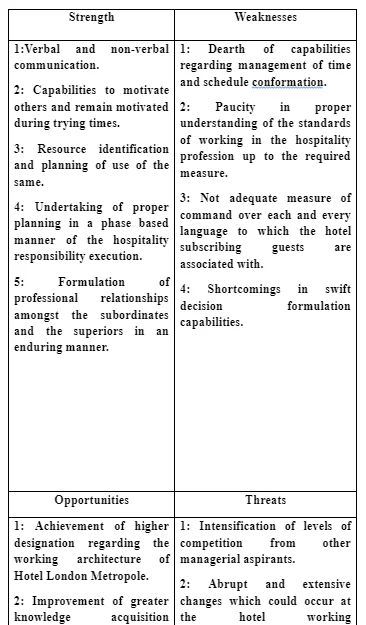
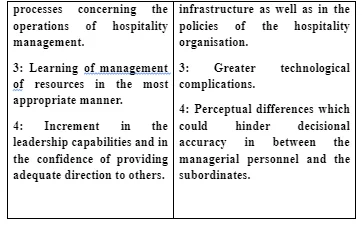
According to Jones Hillier and Comfort (2016), the utilisation of the team inventory based behavioural model could be effective in terms of the formulation of self-perception management from the managerial perspective of any employee of the Hotel London Metropole. From a definitive point of view, I have utilised the multiple team role based method which have been outlined in the Belbin teamwork model to find the necessary situational similarity with my invested work efforts with the perceptual team roles which have been specified in the teamwork model under consideration. According to Kandampully, Zhang and Bilgihan (2015), the roles included in the Belbin teamwork inventory could be identified as the Resource Investigator, Co-ordinator, Shaper, Monitor Evaluator, Team worker, Implementer, Complementer Finisher and Specialist. Out of these nine roles which could be evident within an working team in terms of task accordance to the individuals, I have identified my work roles to be analogous with the roles of the Resource Investigator, Co-ordinator, Monitor Evaluator, Implementer and Completer Finisher. In terms of Monitor Evaluator, I have analysed myself to be well suited to observe the work performance and various outcomes of teamwork based hospitality responsibility management efforts from an outright logical perspective. My ability to judge all the options which could be available with the maximised measure of clarity has made me to be suitable for the role of Monitor Evaluator. My effective communication skills have also provided me with the opportunity to establish effective contacts amongst the entire range of employees at Hotel London Metropole and this has been effective in terms of the role of Resource Investigator. My maturity and confidence to lead the operational team effort are also additional capabilities of mine in this regard and these have provided me with the opportunity to be an effective co-ordinator of teams of working personnel in the hospitality industry under consideration. As a managerial employee, according to Vasquez (2014), my capabilities of undertaking effective planning have permitted me to receive and analyse effective ideas and suggestions as well as reports and this has contributed into my development of skills concerning the role of an implementer. Finally, the role of being a Completer Finisher has been suitable to me as well since I often undertake sudden inspection of the work processes which are under my supervision and also make sure that the hospitality services could be maintained at the specified standards.
P4: Review of learning theoretical approaches regarding professional and personal development processes
According to Kim, Im and Hwang (2015), the process of personal and professional development could be served through the theoretical model of observational learning. Kim, Vogt and Knutson (2015), have outlined three differential models which formulate the overall architecture of observational learning theory. These are the Live Model, the Verbal Model of differential instructions and the Symbolic Model. In the first theoretical model, the demonstration of the behaviour is provided through active participants of any specific task. The second model of verbal instructions involve explanations and descriptions related to various display of behaviours and the examples of these could be highlighted from various television and motion pictures based programmes as well as from books and from the content which could be exhibited in the online media. The third model of symbolic representation could provide accurate information of any particular situation or learning behaviour through fictional means. The objective is to institute a permanent change in the overall behaviour of the learner, such as the professional personnel of the Hotel London Metropole. In this context, observational learning, as has been observed by Lee, Back and Chan (2015), has been effective in demonstrating the propensity of learners to display various new behaviours which could be indicative of their learning behavioural modification.
Assignment 2
LO3. Design a professional development plan, within a specific work context
P5: Formulation of personal development plan
According to Lee (2014), the purpose of formulation of personal and professional development plan could be outlined as the improvement of the operational standards of any employee. To this effect, the crafting of the methods to improve skills and competencies which had been outlined by the previous SWOT analysis could be performed through the development of such a plan.
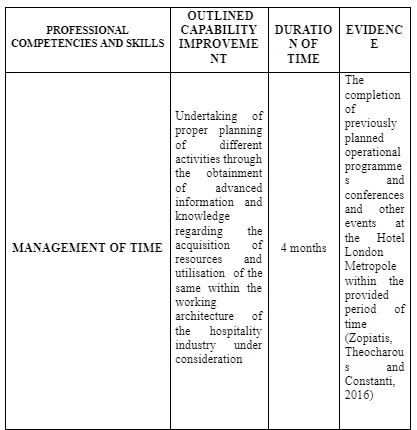

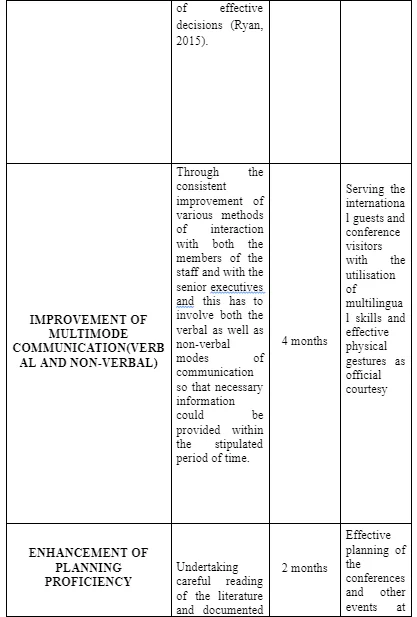
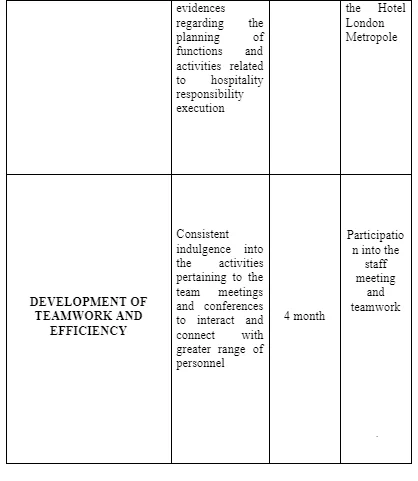
LO4. Demonstrate a range of service industry and transferable skills for a job application
P6: Job interview for the role in service industry

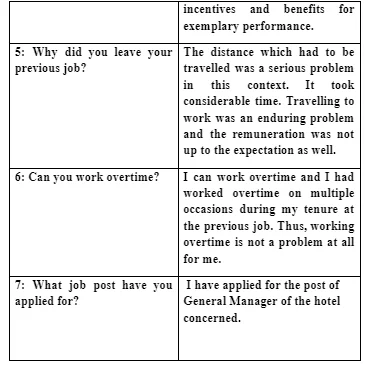

P7: Review of strengths and weaknesses of the interview process
From a definitive perspective, the above demonstrated interview has been reflective of the attempt to identify skills and competencies, which could be transferrable, of the job applicant and of the process to evaluate the measure of suitability of the applicant to the designation applied for. In this respect, the first strength of the interview could be outlined to be the application of a generally accurate scheme of queries which have been utilised by the interviewer to determine the range of skills and capabilities of the interviewee. The categories of enquiry which have been demonstrated in this regard could be considered satisfactory since these involved the work experience related questions, work dedication and skill associated enquiries for the job applicant. Thus, the preliminary information regarding the suitability of the candidate as well as the perception of the applicant regarding the complications and criteria of performance of the post of general manager has been obtained. However, the weakness of the interview could be identified through the nature of the questions which have been put forward. Since these interview questions have not been semi-structured and have been direct, the determination of the extensive details of the work experiences and the peripheral determinants of the performance of the candidate in the previous job have not been able to be outlined.
Conclusion
At the conclusive stage, it could be understood that the preceding study has been performed with the research emphasis on a four phase based task structure where the element of self-evaluation and assessment of personal skills and competencies have been researched about. To this effect, the selected hospitality organisation of Hotel London Metropole has been utilised as the backdrop of the research perspective.
Reference List
Boella, M., 2017. Human resource management in the hotel and catering industry. Routledge.
Brownell, J., 2015. Listening: Attitudes, Principles, and Skills (Subscription). Routledge.
Guchait, P., Lee, C., Wang, C.Y. and Abbott, J.L., 2016. Impact of error management practices on service recovery performance and helping behaviors in the hospitality industry: The mediating effects of psychological safety and learning behaviors. Journal of Human Resources in Hospitality & Tourism, 15(1), pp.1-28.
Jack, K., Stansbie, P. and Sciarini, M., 2017. An examination of the role played by internships in nurturing management competencies in Hospitality and Tourism Management (HTM) students. Journal of Teaching in Travel & Tourism, 17(1), pp.17-33.
Jones, P., Hillier, D. and Comfort, D., 2016. Sustainability in the hospitality industry: Some personal reflections on corporate challenges and research agendas. International Journal of Contemporary Hospitality Management, 28(1), pp.36-67.
Kim, S.S., Im, J. and Hwang, J., 2015. The effects of mentoring on role stress, job attitude, and turnover intention in the hotel industry. International Journal of Hospitality Management, 48, pp.68-82.
Lee, K.J., 2014. Attitudinal dimensions of professionalism and service quality efficacy of frontline employees in hotels. International Journal of Hospitality Management, 41, pp.140-148.
Shmeleva, E.A., Kislyakov, P.A., Kartashev, V.P., Romanova, A.V. and Abramov, A.V., 2017. Innovative activities and socio-psychological security in professional and personal development. In The European Proceedings of Social & Behavioural Sciences (pp. 921-926).
Wang, C.J., 2016. Does leader-member exchange enhance performance in the hospitality industry? The mediating roles of task motivation and creativity. International Journal of Contemporary Hospitality Management, 28(5), pp.969-987.
Zopiatis, A., Theocharous, A.L. and Constanti, P., 2016. Adult vocational decision, career satisfaction and future intention: Insights from the hospitality industry. International Journal of Contemporary Hospitality Management, 28(12), pp.2696-2720.
- 24/7 Customer Support
- 100% Customer Satisfaction
- No Privacy Violation
- Quick Services
- Subject Experts



